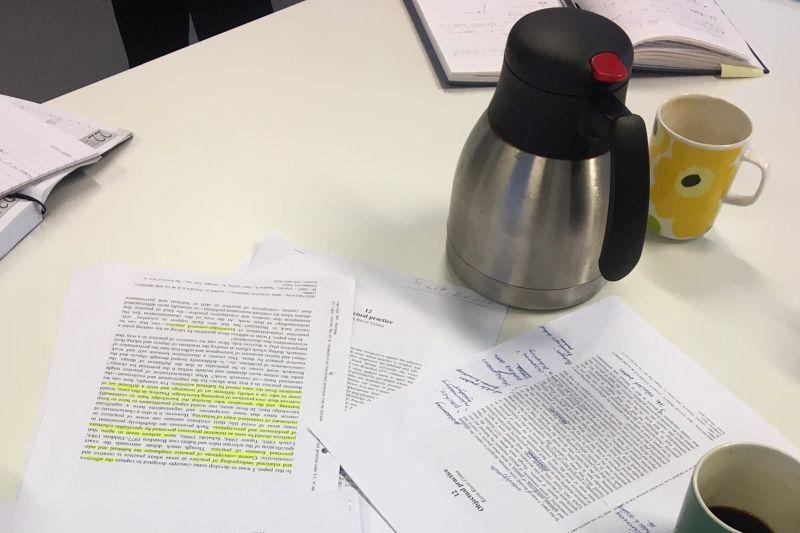Learning in everyday practices – Research – Department of Education and Lifelong Learning
Learning in Everyday Practices - LiEP

Following an expansive view of learning as lifelong and life-wide it could be argued that learning interactions emerge across a wide range of practices beyond formal education. Everyday activities, experiences and relations are important sites for learning, not least when it comes to how people create and establish their identities – who they are, who they are supposed to be, and who they will become.
In the research group Learning in Everyday Practices we explore contexts where adults, teenagers and children spend their daily life (e.g. social media, families, leisure, communities and peer groups) as potential learning spaces. For instance, our research interests concern how teenagers learn to play computer games, how children learn to travel alone from school to the soccer field, how adults learn to deal with parenting obligations, or generally how people in and through the consumption of media and popular culture learn to understand and deal with their surrounding world. Some key concepts are participation, subjectification, governmentality, public pedagogy, lifestyle, literacy, competence, social inclusion/exclusion, and social- and cultural capital. Drawing upon multiple theoretical frameworks and methodological designs, our aim is to better understand and critically discuss the complexities of learning in contemporary society.
Activities
The Discourse Seminar is an interdisciplinary working forum for interaction researchers that meets once a month.
The LiEP research group meets regularly (once a month) for seminars and workshops. At these sessions we present our work in progress, discuss theoretical frameworks and methodological issues, and share ideas for future research.
Ongoing research
The members of the group work in various research projects such as “Unaccompanied traveling children”, “Social Media and Parenthood”, “Prisoners and learning”, "LIM: Language, Integration, Media", “Digital tools in Early Childhood Education and Care” and “Social Life, Social Spaces and Social Distance”.
A selection of recent publications
For further insights into each member's publications please visit their individual NTNU employee profile
Aarsand, P. & Aarsand, L. (2022). «Innenfor», «utenfor» og «i grenseland»: samtaler om sosiale normer og vurderinger i en pandemi [«Inside» «outside» and «in borderlands»: conversations on social norms and values in a pandemic]. Nordisk Tidsskrift for Pedagogikk og Kritikk, 8, 406-422.
Aarsand, L. & Jarvis, C. (2023). Teaching parenting in a pandemic: social and pedagogical discourses. International Journal of Lifelong Education, 42(4), 375-388.
Aarsand, P. (2024). Drawing Minecraft: Small stories on metagames in teenagers’ everyday lives. I B. A. Svendsen & R. Jonsson (Red.), The Routledge Handbook of Language and Youth Culture (s. 289-302).
Farstad, I. E. (2023). Responsibility at a distance: Parents’ accounts of children’s unaccompanied journeys. Children’s Geographies, 21(3), 533-546.
Hrechaniuk, Y. & Aarsand, P. (2024). Making and knowing digital pictures: Young people displaying visual-digital literacies. Young - Nordic Journal of Youth Research.
Næss, S. C. K. & Aarsand, L. (2024). «Heller hurpe enn haremsdame»: En kvalitativ analyse av ekspertise i norske podkaster om dating [«It’s better to be a bitch than a lady of the harem: A qualitative analysis of expertise in Norwegian dating podcasts]. Norsk Sosiologisk Tidsskrift, 8(5), 1-17.
Stenøien, J.M. & Tønseth, C. (2022). Medborgerskap og deltagelse i ‘koronadugnaden’ [Citizenship and participation in the «corona dugnad»]. Norsk Sosiologisk Tidsskrift, 6(3), 65-81.
Members of research group
-
Ida Engan Farstad
ida.e.farstad@ntnu.no -
Amanda Nicole Fayant PhD Candidate
amanda.fayant@ntnu.no Department of Education and Lifelong Learning -
Siri Christine Kvernmo Næss
+4740551967 siri.c.k.nass@ntnu.no -
Camilla Sanna PhD Candidate
+4741454643 camilla.sanna@ntnu.no Department of Education and Lifelong Learning -
Jorun Merethe Stenøien Professor
+47-73592865 jorun.stenoien@ntnu.no Department of Education and Lifelong Learning -
Christin Tønseth Professor
+47-73592872 christin.tonseth@ntnu.no Department of Education and Lifelong Learning
External member
Jenny M Bergschöld,
Researcher
+47 46 31 41 38
SINTEF Digital, Avdeling Helse
Kristine Øygardslia
Post doc NTNU/Associate professor
Nord University
- Tweets by LiePNTNU
- Tweets by LiePNTNU
